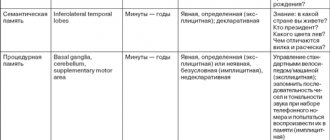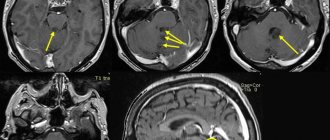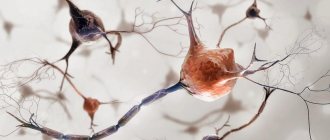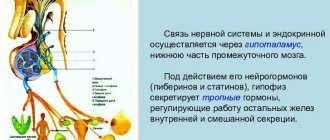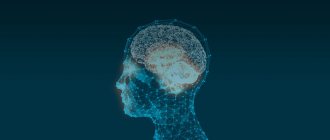What are cognitive functions?
Cognitive function is more than just memory. These include many other properties of the brain that we usually do not pay attention to. But once you lose even one of them, your quality of life drops sharply.
Cognitive functions are:
- memory;
- speech;
- ability to concentrate;
- the ability to recognize objects (by sight, hearing, touch);
- the ability to make purposeful movements.
Often one area of cognitive function suffers while others remain intact. This condition does not greatly interfere with a person’s adaptation and independent life - in this case we are talking about cognitive disorders. When a disorder occurs in several areas, and a person becomes socially maladapted and dependent on the environment, it is worth talking about dementia.
A little about cognitive dissonance
Many people have probably heard this concept, but often find it difficult to understand. Let's take a quick look at this and see how it applies to us. Have you ever noticed that there are very good things that were advised to you, but you did not understand them or saw some kind of strangeness in them. As a result, you didn’t take anything from the above for yourself, and then only after 3 or 5 or even 10 years you understood what they told you and regretted why you didn’t understand it earlier. The whole reason for this is cognitive dissonance. At that moment, you rejected someone's advice because you did not have enough cognitive development to integrate new information. It's like two peaks of a mountain that cannot be connected because there is a very long distance between them. To avoid facing cognitive dissonance, you need to constantly develop a “mountain” that is weaker so that it becomes closer to the “unattainable mountain”.
Practical tips for developing cognitive abilities
In a word, as we said above, you need to constantly develop, but in order to do this effectively, let's take a look at a number of exercises:
- Read educational literature, developing not only professionally, but mentally and spiritually.
- Regularly exercise your mind with various brain exercises that can be found in our service.
- Watch quality content on YouTube for development.
- Strive more for leadership through caring for others than for irresponsibility, thinking only about yourself.
- Develop in the area of financial independence from others, from loans, from employers.
It is important to make a decision for yourself to develop for higher goals than just to live for the banal provision of yourself. Good luck in your development!
Why is dementia dangerous?
In addition to the extremely unpleasant fact of a decrease in a person’s intellectual abilities, this condition is dangerous due to changes in his behavior, which can become threatening both for the patient himself and for others. Moreover, as the disease progresses, patients become dependent on caregivers, and it is the quality of care that determines their life expectancy.
In fact, lack of nutrition, exercise and hygiene often causes death in people with dementia.
Signs of impending dementia
Like any other disease, cognitive disorders are much easier to prevent or slow down in the early stages. What to pay attention to and when to seek medical help:
- forgetfulness, difficulty maintaining attention;
- narrowing the circle of interests and circle of contacts;
- irritability, tearfulness or euphoria;
- sloppiness and untidiness in appearance, at home, at work;
- difficulty in orientation - both in time and place;
- reducing criticism of one’s own condition.
Personality development factors
All factors that in one way or another influence the emotional and intellectual development of a child can be divided into 2 large groups: organic and sociocultural. Organic factors include genetic inclinations that a child inherits from his parents. Of course, this heredity is not unconditional and largely depends on how the pregnancy proceeded. Continuous stress, bad habits of the mother, lack of oxygen and nutrients and other potentially dangerous circumstances of the child’s intrauterine development can subsequently lead to various pathologies in his mental and personal development.
A good socioeconomic status means that parents have enough time and money at their disposal to provide their child with everything necessary for his successful mental development - first of all, their attention.
But no less important in the formation of a healthy emotional and intellectual constitution of a child is his social environment, which is primarily characterized by such a concept as socioeconomic status. Despite the definition of “economic” in the name of this factor, it has a very indirect relationship to the material well-being of the family, although it is partly determined by it. A good socioeconomic status means that parents have enough time and money at their disposal to provide their child with everything necessary for his successful mental development - first of all, their attention. If parents are constantly busy with their own affairs - regardless of whether they make ends meet, working three jobs, or are focused on their own career in a large and successful company - and pay critically little attention to communication with their child, this will inevitably affect on its development in a negative way. That is, socioeconomic status as a factor of cognitive development means the ability of parents to provide their child with due attention, to be sensitive to not only his material, but also emotional needs.
What plays a decisive role: heredity or social environment?
Which specialist should I contact?
There are many reasons that cause cognitive impairment. Among the main ones, it is worth highlighting, of course, vascular dementia and Alzheimer's disease. However, many other neurological conditions are accompanied by a decrease in cognitive functions: Parkinson's disease, Huntington's disease, prion diseases, rare forms of dementia - dementia with Lewy bodies, frontotemporal dementia. These conditions are borderline, they are mainly dealt with by a neurologist, but in case of depression, inappropriate behavior, or psychoproductive symptoms, the help of a psychiatrist may be required.
The opposite situation also happens.
Sometimes mental disorders can mimic cognitive impairment.
Thus, depression very often imitates cognitive disorders, because with depression, performance, the ability to assimilate new information are significantly reduced, the desire to communicate with people and take care of oneself disappears. In a situation of “pseudo-dementia,” treatment of depression leads to the restoration of cognitive abilities.
COGNITIVE DISORDERS
Cognitive personality disorders are specific disorders that occur in the cognitive sphere of an individual and include the following symptoms: decreased memory, intellectual performance and a decrease in other cognitive processes of the brain in comparison with the personal norm (baseline) of each individual. Cognitive or cognitive functions are the most complex processes occurring in the brain. With the help of these processes, a rational comprehension of the surrounding world, interrelation and interaction with it, characterized by purposefulness, is carried out.
Cognitive functions include: perception (reception) of information, processing and analysis of data, their memorization and subsequent storage, data exchange, development and implementation of an action plan. The causes of cognitive disorders can be many ailments that differ in the mechanisms and conditions of occurrence and course of the disease.
CAUSES OF COGNITIVE DISORDERS
Cognitive impairments are functional and organic in nature. Functional disorders in the cognitive sphere are formed in the absence of direct brain damage. Overwork, stress and constant overexertion, negative emotions - all this can be the cause of functional cognitive disorders. Functional cognitive disorders can develop at any age. Such disorders are not considered dangerous and always disappear or their manifestations are significantly reduced after the cause of the disorders is eliminated. However, in some cases, drug therapy may be required.
Organic conditions in the cognitive domain arise from brain damage resulting from disease. They are more often observed in older people and usually have more stable features. However, proper therapy even in these cases helps to achieve improvement in the condition and prevents the increase in disorders in the future.
The most common causes of organic pathologies in the cognitive sphere are: insufficient blood supply to the brain and age-related decrease in brain mass or atrophy.
Insufficient blood supply to the brain can occur due to hypertension, cardiovascular pathology and strokes. Therefore, timely diagnosis of these diseases and their correct treatment are very important. Otherwise, serious complications may occur. Blood pressure, maintaining normal blood sugar and cholesterol levels should be given special attention. There are also vascular cognitive disorders that develop as a result of chronic cerebral ischemia, repeated strokes, or a combination thereof. Such pathologies are divided into two options: disorders arising as a result of pathology of small vessels, and disorders resulting from pathology of large vessels. Neuropsychological features of the detected conditions, reflecting their relationship with disruption of the frontal lobes of the brain, will indicate the vascular etiology of cognitive disorders.
Vascular cognitive personality disorders are quite common today in the practice of neurological pathologies.
With brain atrophy, due to age-related changes, more pronounced pathologies of cognitive functions are formed. This pathological condition is called Alzheimer's disease and is considered a progressive disease. However, the rate of growth of pathologies in the cognitive sphere can vary significantly. Mostly, symptoms are characterized by a slow increase, as a result of which patients can maintain independence and independence for many years. Adequate therapy is of great importance for such patients. Modern methods of therapy help to achieve improvement in the patient’s condition and long-term stabilization of symptoms.
Pathologies in the cognitive sphere can also be caused by other brain diseases, cardiovascular failure, diseases of internal organs, metabolic disorders, alcohol abuse or other poisoning.
SYMPTOMS OF COGNITIVE DISORDERS
Cognitive dysfunction is characterized by specific symptoms, which depend on the severity of the pathological process and which parts of the brain it affects. Damage to individual areas causes impairment of individual cognitive functions, but disorders of several or all functions at once are still more common.
A disorder of cognitive functions causes a decrease in mental performance, memory impairment, difficulty expressing one’s own thoughts or understanding someone else’s speech, and deterioration in concentration. With severe disorders, patients may not complain about anything due to a loss of criticality towards their own condition.
Among cognitive pathologies, the most common symptom is memory impairment. Initially, progressive disturbances arise in remembering recent events, and gradually, distant events. Along with this, mental activity may decrease, thinking may be impaired, as a result of which a person cannot correctly evaluate information, and the ability to generalize data and draw conclusions deteriorates. Another equally common manifestation of cognitive impairment is deterioration in concentration. Individuals with such manifestations find it difficult to maintain vigorous mental activity and concentrate on specific tasks.
The term moderate cognitive personality disorder usually means a disruption of one or more cognitive processes that goes beyond the boundaries of the age norm, but does not reach the severity of dementia. Moderate cognitive impairment is mainly considered a pathological condition, the result of which transformations at this stage are not limited to age-related involutive processes.
According to a number of studies, mild cognitive impairment syndrome is observed in 20% of individuals over 65 years of age. Research also shows that dementia develops in 60% of individuals with this pathology within five years.
Moderate cognitive impairment in 20-30% of cases is stable or slowly progressive, in other words, it does not transform into dementia. Such disorders can go unnoticed by individuals for quite a long time. However, if several symptoms are detected in a short period of time, then it is worth contacting specialists for advice.
The presence of a cognitive disorder is indicated by the following symptoms: difficulties in performing ordinary counting operations, difficulties in repeating information just received, disorientation in an unfamiliar area, difficulties in remembering the names of people new to the environment, obvious difficulties in finding words during normal conversation.
Moderate cognitive disorders, identified in the early phases of their development, can be quite successfully corrected with the help of medications and various psychological techniques.
In order to assess the severity of cognitive impairment, special neuropsychological testing is used, which consists of answering a number of questions and performing certain tasks by the patient. In accordance with the test results, it becomes possible to determine the presence of deviations in certain cognitive functions, as well as their severity. Test tasks can be in the form of simple mathematical operations, such as adding or subtracting, writing something on paper, repeating a few words, identifying objects shown, etc.
DEMENTIA (dementia)
Dementia is a brain condition that results in a gradual decline in thinking ability; in other words, the sharpness of thinking is steadily “dulling.” Dementia most often affects older people - senile dementia (senile dementia) develops. The older we get, the higher our risk of developing dementia. In people aged 65 years, dementia occurs in 5% of cases, and after 80 years - already in every fifth. However, it is very important to understand that dementia is not a normal part of the aging process and should not be confused with the common “forgetfulness of old age.” Remember that the diagnosis of dementia can only be made by a doctor and he also determines the cause of its occurrence.
HOW DOES DEMENTIA MANIFEST?
A person who develops dementia gradually loses the ability to think clearly. His memory is “confused” - in the initial stages he cannot remember events that happened recently, but he very vividly remembers the events of his youth and childhood. Also very characteristic is a decrease in intelligence and poor concentration, which is expressed in the inability to concentrate on anything and complete the planned task to the end. Gradually, a person loses orientation in his surroundings (he ceases to understand where he is, does not recognize his family and friends) and loses the ability to self-service. At the same time, the condition of the body and all its systems often remains satisfactory, which leads to the need for long-term (sometimes lasting for years) care for such a patient.
Changes in his character cause particular concern for caregivers. At first this usually manifests itself as moodiness and irritability, but later the person may become aggressive and try to harm themselves and others. In severe forms of dementia, serious mental impairment is possible.
WHAT ARE THE CAUSES OF DEMENTIA?
Dementia usually has many different causes. Most often it develops due to Alzheimer's disease or due to atherosclerosis of the vessels supplying blood to the brain.
- Alzheimer's disease is the most common cause of dementia (more than 60% of cases). In Alzheimer's disease, the brain is damaged for some unknown reason and the amount of nervous tissue in it, through which thinking occurs, decreases.
- Vascular dementia is the second most common cause of dementia after Alzheimer's disease (about 20% of cases). In this situation, dementia develops as a result of blockage of many small vessels that supply our brain, and as a result, damage to the nervous tissue occurs.
- There are other, rarer causes of dementia, such as alcoholic dementia or dementia after severe infectious diseases affecting the brain (for example, syphilis).
HOW QUICKLY DOES DEMENTIA DEVELOP?
As a rule, dementia progresses slowly over several years, the speed of its development depends on the cause of the disease and the individual characteristics of the person. In patients suffering from Alzheimer's disease, the time from mild memory impairment to complete inability to self-care usually takes about 8-10 years, however, we emphasize again that the rate of progression of the disease may vary from person to person.
WHAT IS IMPORTANT TO KNOW ABOUT TREATING DEMENTIA?
— There are medications that slow down the development of the disease. Remember that the choice of medication and its dose depend on many factors and should be selected individually. Dementia needs to be treated as early as possible!
Support and care for a person suffering from dementia is the most important part of treatment, which falls on the patient’s family and friends.
Reversible dementias
Some neurological and somatic diseases can lead to dementia. With timely diagnosis and treatment, the prognosis is positive.
Potentially reversible dementia may develop in the following cases:
- brain tumors;
- paraneoplastic process, with very different localization of the primary disease;
- severe form of diabetes mellitus;
- severe hypothyroidism;
- severe forms of somatic diseases;
- normal pressure hydrocephalus;
- chronic alcoholism;
- addiction;
- severe deficiency of vitamin B12 (cyanocabalamin) and folic acid (vitamin B9), vitamin B1 (thiamine);
- long-term use of large doses of drugs that contribute to cognitive decline;
- HIV and syphilis.
Complex of provoking factors
There are more than 10 different factors that can lead to cognitive disorders of brain function. The most common cause of such disorders is Alzheimer's disease. This pathology is accompanied by the gradual death of brain neurons, as a result of which its individual functions are suppressed.
The first and most striking sign of Alzheimer's disease is memory loss. At the same time, motor activity and other cognitive functions remain within normal limits for a long time.
In addition to Alzheimer's disease, a decrease in a person's intellectual capabilities is observed in the following neurodegenerative pathologies:
Quite often, cognitive disorders can manifest themselves in vascular diseases of the brain. These include:
Basically, dementia and other forms of psychoneurological disorders are caused by a combination of vascular pathology and circulatory failure in the brain. The risk group for developing such complications includes people who have been diagnosed with:
- atherosclerosis;
- hypertension;
- arterial hypertension.
Cognitive deficits can also develop with the following diseases (although with much lower risks than in the previous case):
Among the probable causes of the development of psychoneurological disorders are severe poisoning and long-term use of psychotropic substances. Head injuries can also lead to dementia and mild impairment of brain function.
Diagnosis of dementia
Based on the severity of symptoms, cognitive impairment is divided into:
- moderate cognitive impairment (self-care is preserved, neuropsychological testing reveals significant impairments);
- dementia - mild, moderate or severe (self-care is impaired, neuropsychological testing reveals significant impairments).
Some researchers identify a stage of mild (mild or subjective) cognitive impairment (MCI), when the patient actively complains of forgetfulness, inattention, and inability to cope with something, but neuropsychological testing determines normative indicators of higher brain functions (HMF) or individual minor difficulties in 1-2 cognitive areas, without disturbing the general cognitive status. Such conditions may be a manifestation of depression, increased anxiety, the result of situational fatigue, or the first preclinical signs of a neurodegenerative brain disease (for example, Alzheimer's disease).
If there are complaints of memory loss, clinical examination of patients is aimed at:
- establishing the fact and assessing the severity and nature of cognitive impairment: neuropsychological testing - targeted assessment of blocks of higher brain functions, determination of the so-called pattern of cognitive impairment, which has its own characteristics in various diseases;
- identification of other symptoms of damage to the nervous system: - thorough neurological examination; — a detailed analysis of the patient’s life history, including hereditary history, data on education, professional activities, bad habits, previous injuries and diseases; — instrumental and laboratory examination to assess the condition of the brain and risk factors for damage to the nervous system and exclude causes of potentially reversible dementia.
Before visiting a neurologist, if the patient has memory complaints, a number of examinations can be performed:
- UAC;
- KAM;
- detailed biochemical blood test (total protein, creatinine, glucose, glycated (glycosylated) hemoglobin, total and direct bilirubin, liver enzymes (AST, ALT, CK, ALP, GGT), total cholesterol, lipid spectrum, potassium, sodium, calcium, vitamin D, vitamin B12, folic acid, TSH);
- MRI of the brain without contrast on a device with a power of at least 1.5 Tesla, with the obligatory performance of coronal sections to assess the volume of the hippocampi (the results are best presented on disk in DICOM format);
- ECG;
- UZDS BCA.
It is also useful to analyze the following patient data:
- bad habits;
- list of medications taken regularly;
- list of usual food products;
- drinking diary;
- physical activity diary, daily routine.
Even with severe chronic disease, the earliest possible diagnosis of the disease and an integrated approach to treatment significantly improves the prognosis of patients and increases their life expectancy.
Cognitive impairment in children: causes, signs and symptoms, diagnosis
The occurrence of cognitive impairment can be caused by such points in the anamnesis as:
- intrauterine hypoxia;
- hypoxia during childbirth;
- birth injuries;
- infectious diseases of the Central nervous system;
- lack of vitamins at an early age;
- brain injuries.
You should be very attentive to the development of your child’s cognitive functions if he has already been diagnosed with serious illnesses or has previously had a traumatic brain injury or an unexamined head injury.
Head injuries in children need to be approached very, very carefully, even if they seem minor at first glance. Such injuries in children are very common and account for up to 30–50% of all injuries. Every year their number increases by about 2%. In the total mass of head injuries, craniocerebral injuries are very common (up to 30% - 45% of cases). The consequences of a traumatic brain injury depend on its severity, timely assistance provided, and the age of the child.
Self-diagnosing the presence or predisposition to cognitive impairment can be done with great caution. Only a specialist can make a conclusion about the presence of violations.
Correction of cognitive impairment in children. Practical advice
Correction of cognitive impairment in children occurs through a set of measures. This is, first of all, drug treatment and psychological and pedagogical support. The child must be provided with a balanced diet and receive a full set of vitamins (especially group B) necessary for the development and functioning of the nervous system.
Drug treatment is prescribed by the doctor based on the results of the examination, examination and after collecting an anamnesis. The task of parents and teachers is to help the child with correction with the help of special classes.
So, what can and should be done at home with your child to level out cognitive impairment:
- Learn poetry, new foreign words, develop your memory.
- Develop emotional intelligence - play games to recognize emotions.
- Retell short texts and find the motives for the behavior of the main characters, find cause-and-effect relationships.
- Make up stories based on pictures.
- Find differences in identical pictures, incl. for speed.
- Count orally, carry out calculations of various kinds without the help of auxiliary aids.
- Play the word game backwards: read the words backwards. This game will lift your spirits and help cognitive development.
- Collect puzzles.
- Make up sequences (for example, collect beads according to a certain pattern, this is the development of both fine motor skills and logic of thinking).
- With small children, play games with pouring water, sorting peas/cereals/beans/buttons into different containers, finger games, etc.
How is dementia treated at the Rassvet Clinic?
The Rassvet Clinic welcomes a multidisciplinary approach to this problem. A thorough examination by a doctor, a lengthy conversation, testing on a number of scales and the joint work of a neurologist and psychiatrist help to make the correct diagnosis, and additional examinations can identify the specific cause of cognitive decline. This is what helps to develop further effective treatment and rehabilitation tactics.
Drug therapy for dementia can reduce the rate of progression of the disease and prolong the patient's life. Active learning of new skills, constant memory training (cognitive stimulation) and emotional support of loved ones are also of fundamental importance in the treatment of dementia - especially at the stage of moderate cognitive impairment.
Diagnostics
To identify pathology and determine the degree of cognitive impairment of brain activity, the psychotherapist conducts a thorough survey of the patient for the presence of present symptoms, current diseases, hereditary predisposition to such disorders, and the patient’s mental and emotional state. The specialist also clarifies the duration of taking certain medications that could cause cognitive impairment. The attending physician refers the patient for examination to a neurologist to identify possible neurological diseases that could cause such symptoms.
The state of mental activity is determined exclusively by a specialized specialist through neuropsychological testing. For cognitive disorders in older people, the MMSE scale is used, which is a list of questions. The result of the test is to determine the state of memory, attention, speech, visual perception, and orientation in space. The scale is also used to assess the patient’s behavioral factors and the effectiveness of the treatment therapy.
Acquired cognitive disorder is diagnosed based on special laboratory tests. The attending physician evaluates the obtained biochemical and clinical blood tests and various other indicators. Instrumental examination of pathology is carried out using the following devices: electroencephalography, computer and magnetic resonance imaging, Dopplerography of the great vessels.
